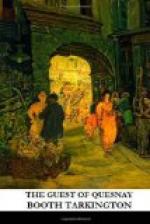A half-light had broken upon me as he talked, pacing the floor, thundering his paean of triumph, his Titanic gestures bruising the harmless air. Only one explanation, incredible, but possible, sufficed. Anything was possible, I thought—anything was probable—with this dreamer whom the trump of Fame, executing a whimsical fantasia, proclaimed a man of science!
“By the wildest chance,” I gasped, “you don’t mean that you wanted him to fall in love—”
He had reached the other end of the room, but at this he whirled about on me, his laughter rolling out again, till it might have been heard at Pere Baudry’s.
“Ha, my dear sir, you have said it! But you knew it; you told him to come to me and tell me.”
“But I mean that you—unless I utterly misunderstand—you seem to imply that you had selected some one now in France whom you planned that he should care for—that you had selected the lady whom you know as Madame d’Armand.”
“Again,” he shouted, “you have said it!”
“Professor Keredec,” I returned, with asperity, “I have no idea how you came to conceive such a preposterous scheme, but I agree heartily that the word for it is madness. In the first place, I must tell you that her name is not even d’Armand—”
“My dear sir, I know. It was the mistake of that absurd Amedee. She is Mrs. Harman.”
“You knew it?” I cried, hopelessly confused. “But Oliver still speaks of her as Madame d’Armand.”
“He does not know. She has not told him.”
“But why haven’t you told him?”
“Ha, that is a story, a poem,” he cried, beginning to pace the floor again—“a ballad as old as the oldest of Provence! There is a reason, my dear sir, which I cannot tell you, but it lies within the romance of what you agree is my madness. Some day, I hope, you shall understand and applaud! In the meantime—”




